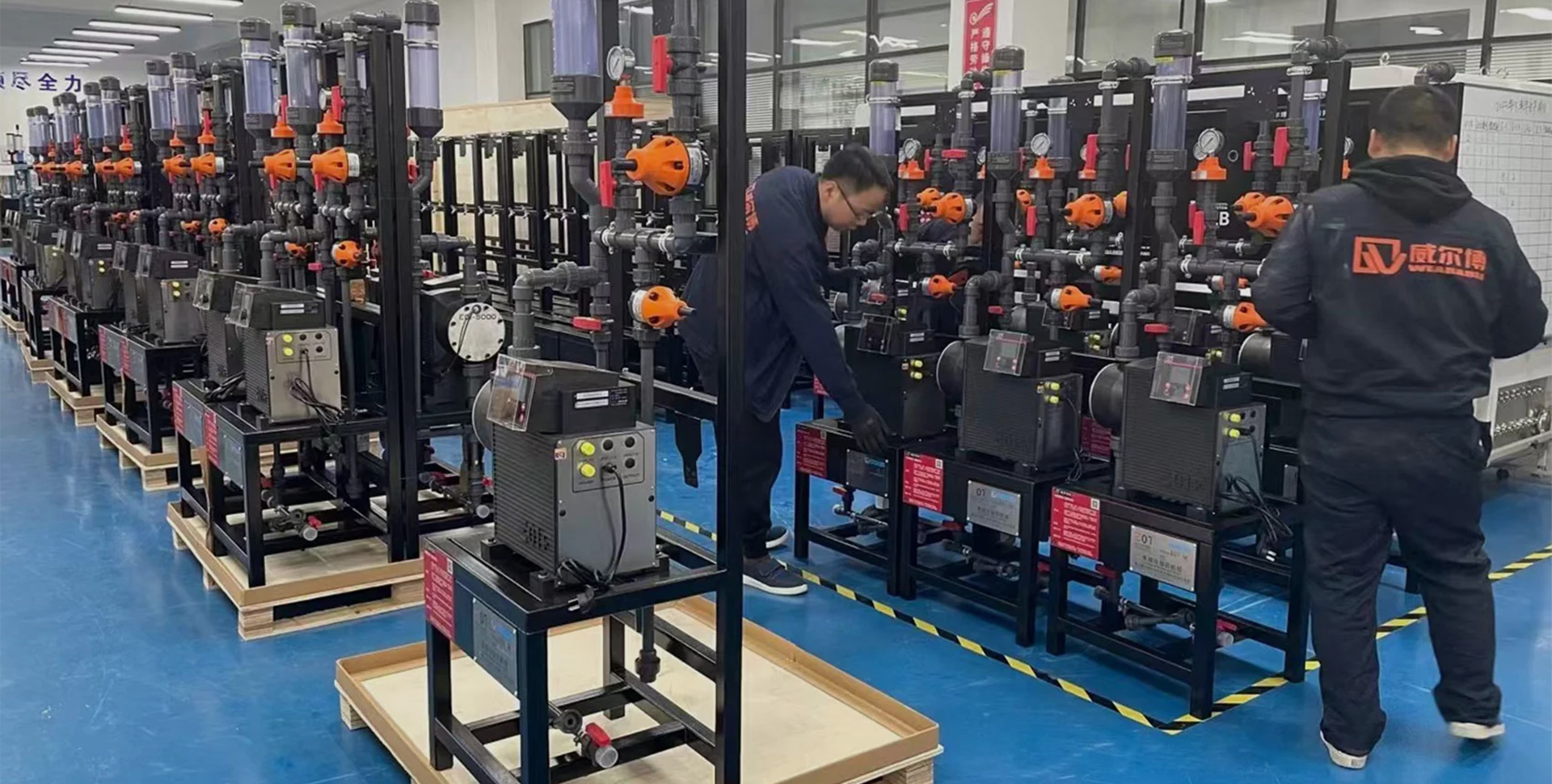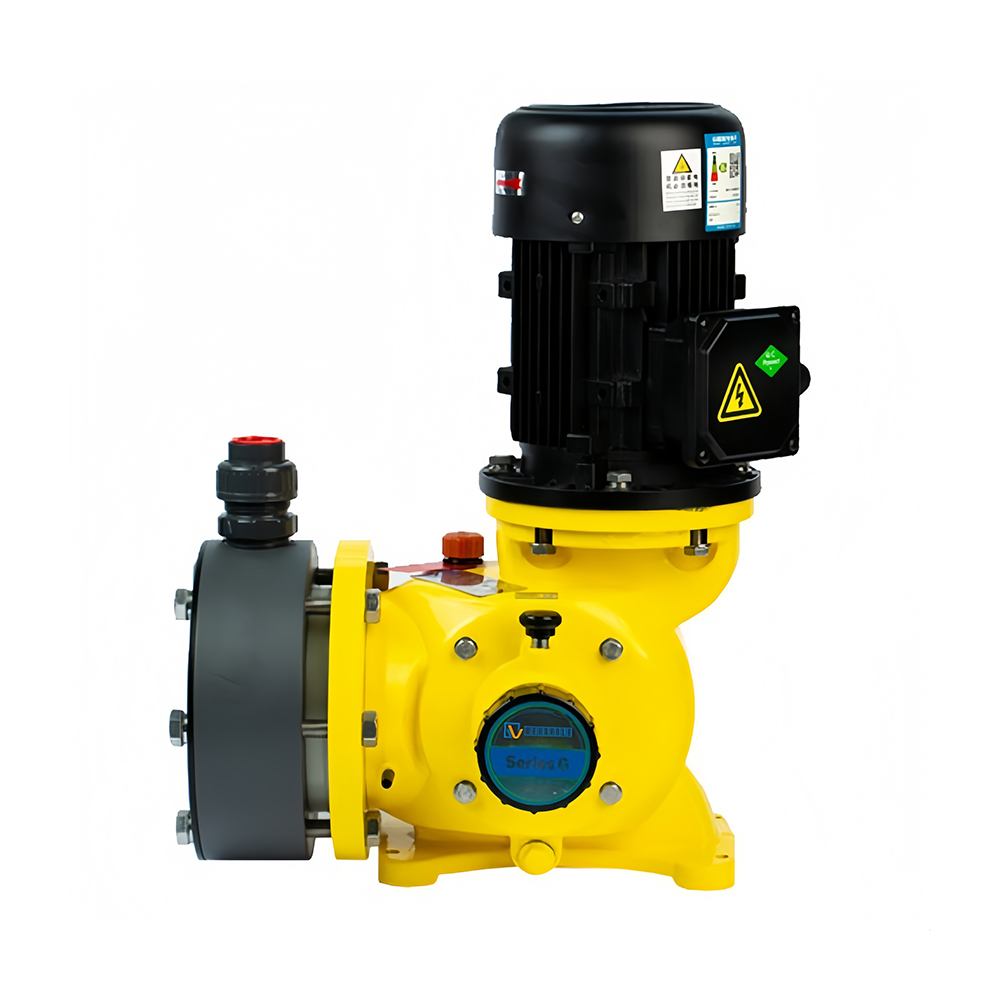What is the difference between hydraulic and Mechanical Diaphragm Pumps?
Mechanical diaphragm pumps are widely used in precise fluid metering tasks where reliability, safety, and chemical compatibility are essential. Their simple mechanical drive structure and leak-free diaphragm design allow them to handle corrosive, viscous, or particle-laden liquids across various industries.
Drive Mechanism
Mechanical Diaphragm Pumps: Use a direct mechanical linkage (usually a crank, cam, or motor-driven shaft) to move the diaphragm. This creates a fixed and predictable displacement per stroke, making the design simpler and easier to maintain.
Hydraulic Diaphragm Pumps: Use hydraulic oil to push the diaphragm indirectly through a hydraulic chamber. This allows smoother diaphragm movement, higher pressures, and greater accuracy.
Pressure and Flow Capability
Mechanical Type: Suitable for medium-pressure dosing tasks. Typical pressure is lower than hydraulic pumps but sufficient for most water treatment, chemical dosing, and industrial feeding applications.
Hydraulic Type: Capable of very high discharge pressures due to hydraulic amplification, often used in high-pressure acid dosing, petrochemical processes, or large industrial systems.
Maintenance Requirements
Mechanical Type: Fewer components, no hydraulic oil contamination risk, easier to install, and simpler to maintain.
Hydraulic Type: Requires periodic oil inspection, air venting, and hydraulic cleaning, but offers longer diaphragm life through balanced pressure control.
Application Suitability
Mechanical Pumps are ideal for cost-effective, moderate-precision dosing tasks.
Hydraulic Pumps are preferred for demanding, high-pressure, high-accuracy environments.
What Are Mechanical Diaphragm Pumps Used For?
Thanks to their robust design, corrosion-resistant diaphragm materials, and stable metering capability, mechanical diaphragm pumps are used widely across modern industrial systems.
a. New Energy Copper Foil Manufacturing – Additive Dosing
Mechanical diaphragm pumps are used for accurately metering additives such as wetting agents, dispersants, or functional chemicals during copper foil coating and electrolyte preparation. Their corrosion-resistant structure ensures stable long-term operation in electrolyte-rich environments and reduces the risks of leakage or chemical contamination.
b. Water and Wastewater Treatment – Chemical Injection
In municipal or industrial wastewater plants, these pumps handle disinfectants, coagulants, pH adjusters, and anti-foaming agents. They remain effective even under continuous operation and fluctuating backpressure. Self-priming capability makes them suitable for suction lift installations common in dosing cabinets and chemical rooms.
c. Bio-Energy Production – Enzyme and Additive Feed
Bio-energy systems require accurate delivery of enzymes, catalysts, and nutrient solutions. Mechanical diaphragm pumps excel at metering these sensitive fluids without exposing them to shear forces or cross-contamination, preserving enzyme activity and ensuring consistent process efficiency.
d. Chemical and Smelting Processes – Acid and Additive Dosing
Their ability to handle corrosive acids such as sulfuric, hydrochloric, or process-specific additives makes them a reliable choice in chemical plants and smelting operations. The leak-free diaphragm design improves workplace safety and ensures compliance with chemical handling standards.
Frequently Asked Questions About Mechanical Diaphragm Pumps
Q1: What materials are used in the construction of your pumps?
A1: We use high-quality materials such as PTFE, PVC, and stainless steel to ensure excellent durability and resistance to chemical corrosion.
Q2: Are your pumps capable of handling corrosive chemicals?
A2: Yes, our pumps are specifically designed to handle a wide range of corrosive and abrasive chemicals with high efficiency and reliability.
Q3: Can your pumps handle high-viscosity liquids?
A3: Yes, our pumps are capable of handling liquids with varying viscosities , including high-viscosity fluids.Concentration mode 100% 50% 25%.



